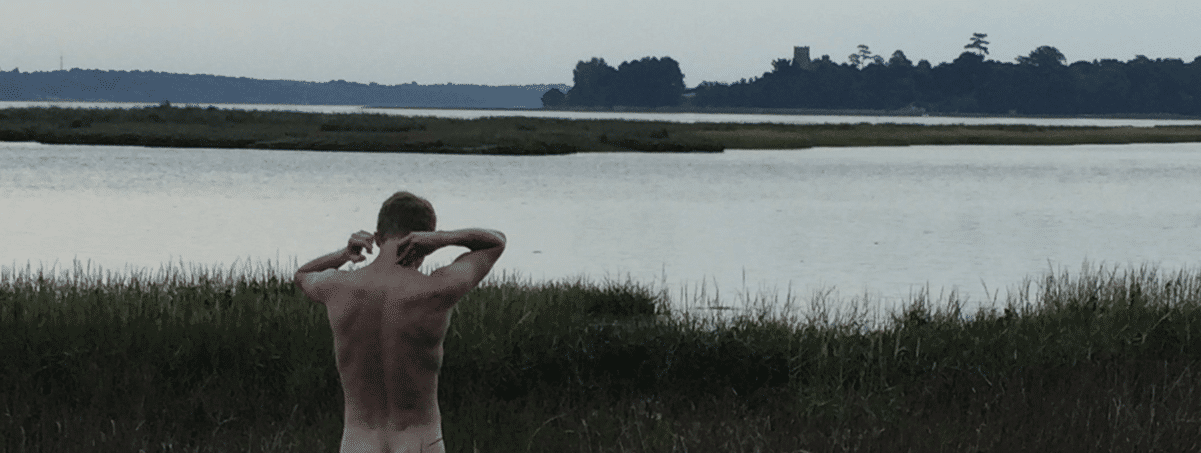It’s no exaggeration to suggest that feeling lonely is a byproduct of being queer. As we grow up and gradually realize we’re something other than heterosexual and/or cisgender, we can feel isolated from the mainstream straight culture that dominates in school, on TV, and, most likely, at home.
Later, even if we’ve fully embraced who we are and now live in a big, liberal city, it can take time to find what Tales of the City author Armistead Maupin calls a “logical family” of like-minded friends and peers. Every queer person’s experience of loneliness is different, but for many of us, it can be profound.
London-based artist Richard Dodwell is so fascinated by this frequently painful aspect of LGBTQ life that he’s curated and published Not here: A queer anthology of loneliness.”
It’s a beautiful and moving volume in which an inclusive mix of poets, activists, writers, and artists respond to the idea of what it means to be lonely today. Dodwell says he actually came up with the idea after attending a reading of Close to the Knives: A Memoir of Disintegration, the recently reprinted account of life and death during the AIDS crisis by legendary New York City artist David Wojnarowicz.
“All these queer artists and writers had been invited to come up and read, so it became a gathering of all these different people who identified with his writing,” Dodwell tells me over the phone. “For me, it was such a nice, warm experience that suddenly I wanted to make something that kind of continued that sense of people who probably feel loneliness in their daily life having an opportunity to come together and share something.”
Dodwell says his own experience of loneliness has been intense. “It nearly killed me,” he says matter-of-factly, and without a shred of self-pity. “I really came up against it.”
“[But] I think that actually sharing my loneliness – which is, I suppose, what the anthology was about – was a way to perhaps selfishly challenge my own sense of loneliness,” he continued.
After he’d hatched the anthology idea, Dodwell put a call-out for submissions on social media and set potential contributors an ambitious deadline of just one week.
“I wanted it to be very reactive and have a sense of urgency,” he explained. “I didn’t want people to have too much time to think about what they were going to write or create or submit. I wanted it to have that sense of spontaneity.”
The entire process from commissioning to editing took him only a month.
Without wanting to put words in his mouth, I asked Dodwell if he thought that curating the anthology was a way of taking control of his own loneliness. “I think so, yeah,” he replies after a short pause.
“But maybe in a more simplistic way than that, it was about reaching out to people and wanting to counteract a feeling of loneliness. It was a way of bringing people together. In a weird way, though it’s an anthology about loneliness, it doesn’t feel lonely to me. The experience of actually making it hasn’t been lonely at all. And people have said to me that they find it uplifting.”
“I think that’s what I’m most proud of with the anthology,” Dodwell proudly replies. “What I wanted to do was make a network in the queer community that wasn’t just about sex and the dating scene, but was about integrating creativity and sharing an experience honestly.”
“I mean, just talking about things like loneliness and giving people space to do that is quite nice, I think,” he continued.
Since the anthology was published in October, Dodwell has received messages from queer people all over the world who say they’ve found it helpful.
“Some of the most incredible messages have been from people living in places where it’s illegal to be gay, even punishable by death,” he said. “[And they say] it’s giving us hope to be reading and seeing things about other people who experience loneliness.’”
“When I read something like that, it’s pretty amazing.”
Find out more (and order the anthology) at http://www.richdodwell.com.
Don't forget to share:
Help make sure LGBTQ+ stories are being told...
We can't rely on mainstream media to tell our stories. That's why we don't lock our articles behind a paywall. Will you support our mission with a contribution today?
Cancel anytime · Proudly LGBTQ+ owned and operated
Read More in Culture
The Latest on INTO
Subscribe to get a twice-weekly dose of queer news, updates, and insights from the INTO team.
in Your Inbox













